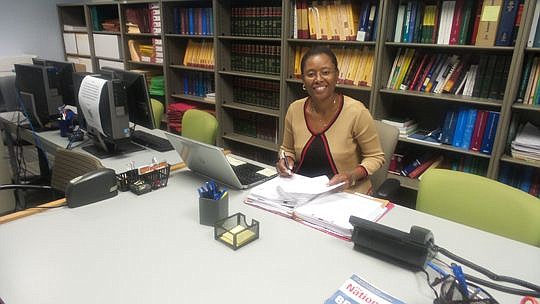
The experiential learning clinics at Florida Coastal School of Law provide assistance for hundreds of low-income people in Northeast Florida every year.
The Immigrant and Human Rights Clinic represents immigrants seeking asylum, family reunification as well as survivors of human trafficking and other violent crimes.
Law students work under the supervision of immigration attorney and Florida Coastal faculty member Ericka Curran
Recently, she and a student advocate, Dina Hunter, helped provide permanence for a family impacted by the earthquake and political unrest in Haiti.
Curran describes the pro bono immigration case:
What were the basic facts of your case?
Our client was a child when she fled the political unrest and devastation of the earthquake in Haiti to reunite with her father in the United States.
As soon as she arrived in Jacksonville, she was referred to Coastal’s immigration clinic.
What were you able to accomplish for your client?
Students filed an asylum application based on past persecution of her family and gender-based persecution.
Jacksonville Area Legal Aid’s Refugee Immigration Project attorneys assisted our client’s father with naturalization so he would be able to file a family-based petition for her.
Once he was naturalized, we were able to file a family-based petition and a legal permanent resident card for our client.
One of the student advocates was Dina Hunter, a third-year student who is originally from Haiti.
She represented our client jointly with me during the legal permanent resident application and interview. We are happy to report our client was granted her legal permanent resident status.
Why was the outcome important to your client?
She is now able to live safely in the United States with her family.
We often take for granted the wonderful freedoms we enjoy in the U.S.
Families who come from nations fraught with poverty, oppression and destruction understand the value of what we have here and the importance of the support of their nuclear families.
How does the clinical work impact the law students?
Immigration cases often last for several years and this was a three-year case.
From start to finish, students serve as advocates for clients. They invest themselves and learn firsthand the importance of each person’s contributions.
Students learn valuable skills while serving vulnerable communities. Dina worked countless pro bono hours beyond the work required for the clinical course and, in the end, the rewards were great.
What advice do you have for attorneys considering pro bono involvement?
Supervised pro bono work can be an excellent way for emerging attorneys to gain skills.
Our students are required to do pro bono work and complete at least six credits in experiential learning (clinics and externships) as a graduation requirement. Florida Coastal clinical programs served more than 650 indigent clients last year.
The need in our community for pro bono attorneys in all areas of civil practice is great and the opportunities are varied. Our low-income population needs each attorney to be involved.
Attorneys interested in pro bono opportunities in Northeast Florida are encouraged to contact [email protected].